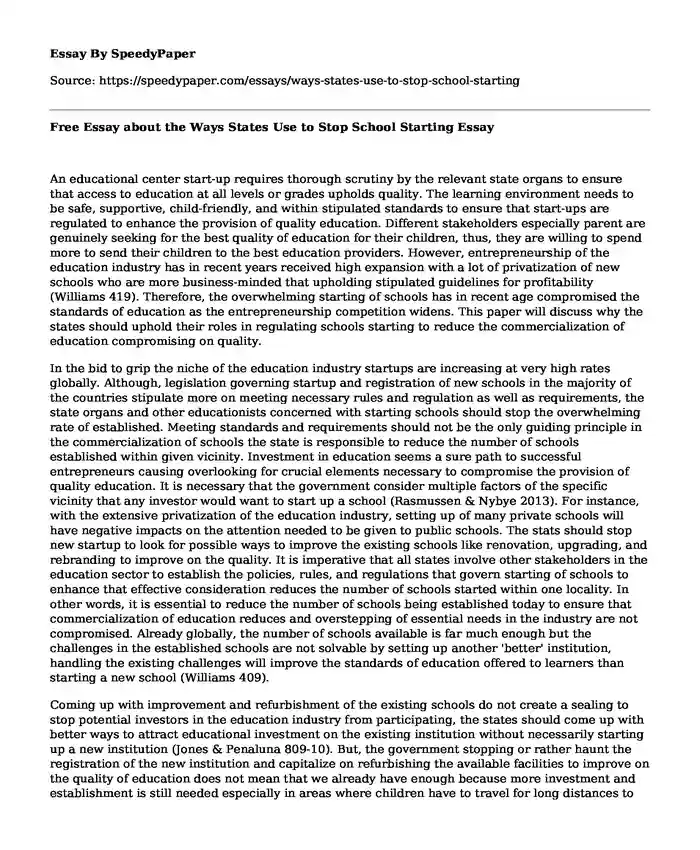
| Type of paper: | Argumentative essay |
| Categories: | Education Business School |
| Pages: | 3 |
| Wordcount: | 693 words |
An educational center start-up requires thorough scrutiny by the relevant state organs to ensure that access to education at all levels or grades upholds quality. The learning environment needs to be safe, supportive, child-friendly, and within stipulated standards to ensure that start-ups are regulated to enhance the provision of quality education. Different stakeholders especially parent are genuinely seeking for the best quality of education for their children, thus, they are willing to spend more to send their children to the best education providers. However, entrepreneurship of the education industry has in recent years received high expansion with a lot of privatization of new schools who are more business-minded that upholding stipulated guidelines for profitability (Williams 419). Therefore, the overwhelming starting of schools has in recent age compromised the standards of education as the entrepreneurship competition widens. This paper will discuss why the states should uphold their roles in regulating schools starting to reduce the commercialization of education compromising on quality.
In the bid to grip the niche of the education industry startups are increasing at very high rates globally. Although, legislation governing startup and registration of new schools in the majority of the countries stipulate more on meeting necessary rules and regulation as well as requirements, the state organs and other educationists concerned with starting schools should stop the overwhelming rate of established. Meeting standards and requirements should not be the only guiding principle in the commercialization of schools the state is responsible to reduce the number of schools established within given vicinity. Investment in education seems a sure path to successful entrepreneurs causing overlooking for crucial elements necessary to compromise the provision of quality education. It is necessary that the government consider multiple factors of the specific vicinity that any investor would want to start up a school (Rasmussen & Nybye 2013). For instance, with the extensive privatization of the education industry, setting up of many private schools will have negative impacts on the attention needed to be given to public schools. The stats should stop new startup to look for possible ways to improve the existing schools like renovation, upgrading, and rebranding to improve on the quality. It is imperative that all states involve other stakeholders in the education sector to establish the policies, rules, and regulations that govern starting of schools to enhance that effective consideration reduces the number of schools started within one locality. In other words, it is essential to reduce the number of schools being established today to ensure that commercialization of education reduces and overstepping of essential needs in the industry are not compromised. Already globally, the number of schools available is far much enough but the challenges in the established schools are not solvable by setting up another 'better' institution, handling the existing challenges will improve the standards of education offered to learners than starting a new school (Williams 409).
Coming up with improvement and refurbishment of the existing schools do not create a sealing to stop potential investors in the education industry from participating, the states should come up with better ways to attract educational investment on the existing institution without necessarily starting up a new institution (Jones & Penaluna 809-10). But, the government stopping or rather haunt the registration of the new institution and capitalize on refurbishing the available facilities to improve on the quality of education does not mean that we already have enough because more investment and establishment is still needed especially in areas where children have to travel for long distances to access schooling. Starting a new institution to solve the shortcomings of the old does not yield the desired results. The government all over the world should come up with strict regulation reducing the number of schools being started to ensure that commercialization of the education industry does not compromise on the quality provision.
Works cited
Jones, C. & Penaluna, A. Moving beyond the business plan in enterprise education. Education + Training, 2013, 55, 804-814.
Rasmussen, A. & Nybye, N. Entrepreneurship Education: Progression Model. Odense C, Denmark: The Danish Foundation for Entrepreneurship - Young Enterprise, 2013.
Williams Middleton, K. Becoming entrepreneurial: gaining legitimacy in the nascent phase, International Journal of Entrepreneurial Behaviour & Research, 2013, 19, 404-424
Cite this page
Free Essay about the Ways States Use to Stop School Starting. (2022, Jul 01). Retrieved from https://speedypaper.com/essays/ways-states-use-to-stop-school-starting
Request Removal
If you are the original author of this essay and no longer wish to have it published on the SpeedyPaper website, please click below to request its removal:
- Free Essay Example about Genetic Diagnosis
- Free Essay about Death - The Unwanted Guest
- Pregnancy in Workplace - Free Essay in Human Resource Management
- Essay Sample for Everyone: Silence as Metaphor of Feminist
- Yalom's When Nietzsche Wept - Free Essay in Psychology
- Free Essay Sample - Older Adults and Substance Abuse
- Ethical Pressures Essay Sample for Everyone
Popular categories




